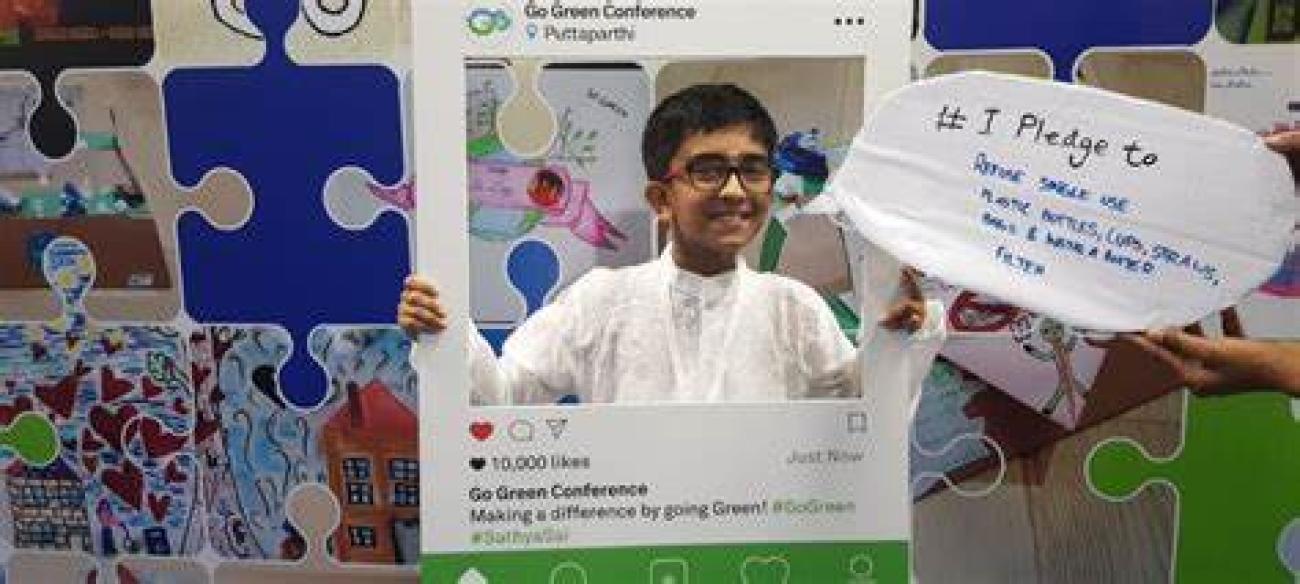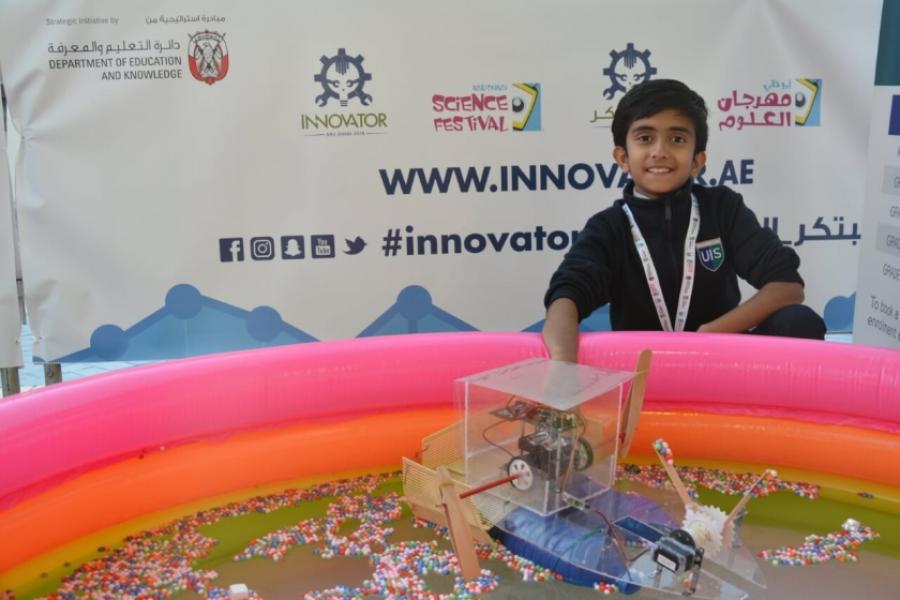Young environmentalist in the United Arab Emirates invents robots to help protect nature

Manikandan is a young environmentalist leading the way in finding innovative solutions to some of the environmental challenges in the United Arab Emirates.
This story was originally published by UNEP.
Asked about the role of children in creating a positive impact on the environment in the United Arab Emirates, 11-year-old Sainath Manikandan passionately says: “the backbone of a nation is its youth. We have the power to bring about a change in our schools, homes and environment, and together we can create a wave of change.”
Manikandan is a young environmentalist leading the way in finding innovative solutions to some of the environmental challenges in the United Arab Emirates, through raising awareness within his community of how individual action can drive far-reaching, positive change. Having developed a passion and determination for championing environmental causes from a very young age, he has been supported by his family and the wider community in pursuing his goal of creating positive and enduring impact on the environment.
For Manikandan, technological innovation is at the heart of environmental protection. “As a green activist, I strongly believe that we can change our existing practices into green and sustainable solutions using technology,” he argued. Inspired by the Sustainable Development Goals, and the UN Environment Programme’s Clean Seas and Beat Plastic Pollution campaigns, Manikandan created two prototypes of robots that support the principles and practices expressed under goal 14—Life Below Water, and goal 2—Zero Hunger.
MBot, the ocean cleaning robot
The Marine Robot Cleaner, or the MBot Cleaner, tackles the global issue of marine litter. “The MBot Cleaner is a prototype robot that can remove floating waste from water surfaces. I have designed an app, the Plastic Cleaner App, to send start and stop signals to my MBot Cleaner, which will be available on the coastlines and in different locations across the seas and oceans. As soon as the signal from the Plastic Cleaner App reaches the nearest MBot Cleaner, it moves to that particular location in the ocean to collect plastic waste,” explained Manikandan.
He recalled his visits to various cities in his home country, where he was able to see the plastic waste crisis firsthand, as a defining experience in his journey towards becoming an active, outspoken environmentalist. Manikandan received a lot of recognition and won several awards related to the MBot Cleaner, but what motivates him to find creative solutions to pressing environmental challenges goes far beyond. “Plastic pollution is an important global issue. I want to change the world’s attitude towards plastic within a generation because if the same trend continues by 2050, there will be more plastics in the seas and oceans than marine species. I want us to preserve and conserve our marine environment,” stated Manikandan.

Agribot, the farming robot
His second robot prototype, targeting goal 2—Zero Hunger, specifically through promoting and supporting sustainable agriculture, is called Agribot. It is estimated that 821 million people were undernourished in 2017, and goal 2 aims to end all hunger and malnutrition by the year 2030. At the heart of achieving these targets is promoting sustainable agricultural practices and ensuring access to resources that can nourish and sustain the global population. Manikandan hopes that his agricultural robot can provide a form of support for pressured farmers in plowing the land, sowing the seeds and covering the seeds with soil. Agribot will greatly benefit the farmers as it is easy to control and programme as per the farmers’ needs. “I hope that through this initiative I can help remove hunger from our society. I want to help our environment by developing my prototype robots on a bigger scale,” he added.
Despite being an ardent supporter of the role technological innovations can play in tackling environmental challenges, Manikandan recognizes that a social shift is necessary for the achievement of large-scale change. He has been heavily involved in community-level activism and has been raising awareness about plastic pollution and the actions that individuals can take to minimize the plastic waste they generate.
“I have started my own campaign, called the PEPC Campaign, to inform people about the importance of recycling and to put an end to single-use plastics. I am collecting paper, electronic waste, plastics and cans for recycling from my neighborhood. I want to motivate my community to be a part of environment protection movements and engage them to heal the environment and love the planet,” Manikandan explained. The awareness-raising campaign revolves around promoting the 6 Rs – Reduce, Reuse, Recycle, Repair, Rethink, and Refuse.
“We can learn a lot from children and youth,” says Mohammed Angawi, focal point for the United Arab Emirates at the UN Environment Programme’s (UNEP) West Asia Office. “It is critical to empower them and give them the space for creativity and innovation. Young people can influence behavioural change in adults, which can then lead to better decision-making. With the right awareness, tools, and pro-environment attitude, they can lead us all towards a healthy, vibrant planet.”
Beyond the PEPC campaign, Manikandan regularly carries out presentations and talks, and writes articles for magazines discussing environmental issues and the role people can play in creating a more sustainable environment. He has already begun to notice the positive impact his activism is having on the wider community. There has been a lot of interest from his peers and friends in participating in his campaign, and many began making small changes in their daily lives such as carrying refillable bottles, refusing plastic straws and bags, planting trees, and walking or taking public transport to school or work when possible.
Manikandan is an active member of the Emirates Environment Group in Dubai, a UNEP-accredited environmental professional working group that has been using education and action programmes, projects and campaigns, and community-level engagement to highlight and address key environmental challenges facing the United Arab Emirates and the region. The group has been extremely active in raising awareness and promoting best practices, supporting government agencies, and being a part of national delegations participating in regional and international summits. The Emirates Environment Group has also empowered youth, such as Manikandan, to pursue their passion for environmental causes.



